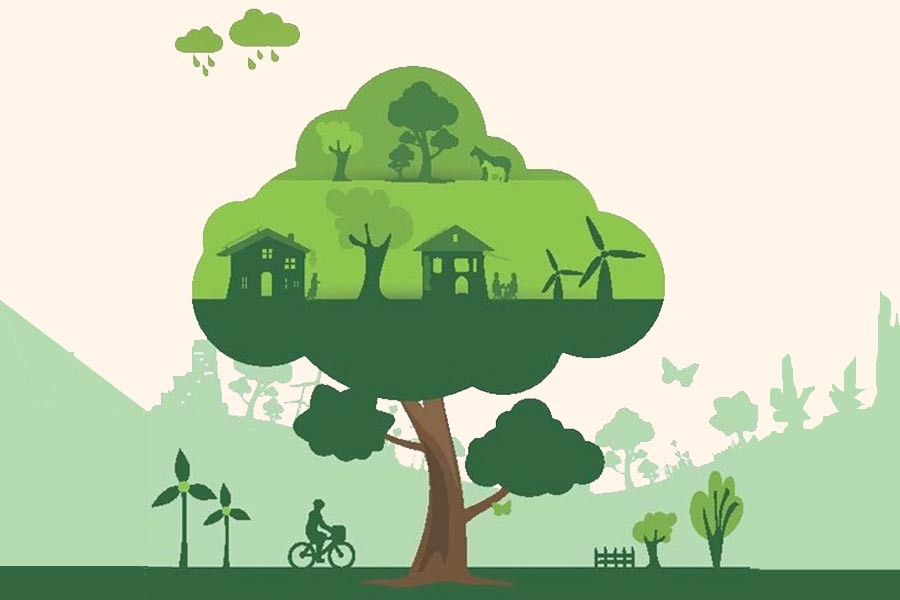
Published :
Updated :

The searing day temperature which has made life of the country's people miserable over the last one week cannot be termed normal. In accordance with the country's seasonal features, the months of May-June see the start of scorching summer days. The summer-dominant country has been witnessing it for ages. What strikes the weather behaviour experts is the declining rate of rainfall accompanied by nor'westers. In the recent times, the summer rains, coupled with storms, have continued to become rarer with every passing year. In tandem with it, sultry heat keeps jeopardizing the life of people in almost all parts of the country. The yearly 2-month winter is fast becoming rare in almost all parts of the land. So are the prolonged monsoon and heavy rains.
Experts tend to call these weather-related aberrations the fallout of climate change which has lately been raging throughout the globe. Bangladesh is considered one of the affected countries. Against this backdrop, the allocation for the environment, forest and climate change sector in the national budget for the 2023-2024 fiscal year has been shown at Tk 1,639 crore (Tk 16.39 billion). The size is a little larger than that allocated in 2022-2023 FY. Environmental activists have yet to come up with their formal reactions to the budgetary allocation. They have long been used to the futility of the disapproval or rejection of these allocations. Given the sorry state to which Bangladesh has declined in maintaining environmental norms, the activists believe they had better keep silent and go ahead with their activism.
The climate change phenomenon has a vast canvas, involving the entire stratosphere of the planet. Climate goes much beyond the immediate national boundaries. The issues they consider range from the rise in sea level, climate displacement, climate-hit refugees to sea-borne cyclones, hurricanes, typhoons etc. Moreover, excessive rains and drought in unlikely countries are also prompted by climate change impacts. These calamities belong to the subjects requiring long debate sessions for reaching a consensus. So are the cases for greenhouse gas emission, global warming and the binding ceiling for heat-trapping carbon, released mostly by industrial belts in the developed and fast-developing countries. Use of the highly polluting coal is also a problem that singles out a number of industrialised and developing countries.
Bangladesh can take pride in its regular presence in almost all the global climate meets. It displayed the country's climate camaraderie as it attended the first Earth Summit held in Brazil's Rio de Janeiro in 1992. As a lower middle-income country, Bangladesh still has to deal with some basic and primary environmental hazards. Environmental activists agree unanimously that the country's one of the most dominant environmental hazards is the felling of trees indiscriminately. Thanks to the initial start of aridity in many areas of the country, Bangladesh may have to brace for desertification much earlier than feared. That the recent seasonal abnormalities of the country have a lot to do with deforestation is now a proven fact. Mindless tree felling in vast idyllic expanses outside large cities is now a common spectacle. However, the most abhorrent of the tree felling acts is the denuding of lush green expanses in the Chattogram Hill Tracts. A section of unscrupulous people have long been clearing the areas to build structures for recreation.
In Dhaka, the face-off between different urban authorities bent on felling trees and the activists of nature saving, especially trees, continues unabated. It's because large tree-filled swathes and small tracts of trees are very much visible in the capital's urban areas. Making a place shorn of lush green trees cannot escape people's notice. Hardly does a week pass these days, when campaigners of tree saving movement are not seen holding protest rallies against one or another establishment --- who create vacant lot by felling trees. Their aim is to use the space thus obtained for the purpose of building concrete structures. In cases, the information of occupying the artificial space belonging to the public gets leaked. Murmurs of protest follow. With the joining of sympathisers, the activists get emboldened, and the protests end up being an organised movement.
Many might feel eager to refer to a sardonic remedy to the face-off between the tree protectors and the tree fellers. In order to do away with the seemingly never-ending bad blood, the compulsive tree fellers can be allowed to level trees whenever and wherever they want to. With a city being almost shorn of trees, there will be no fracas over them. Few can say for sure that the plan will not be welcomed by a section of developers. When it comes to environmental degradation in the urban areas, especially in Dhaka, different types of pollution come to the fore. The dominant place goes to air pollution. Thanks to the omnipresent air pollution plaguing Bangladesh, the country is being dubbed the worst performer in the Air Quality Index (AQI) almost annually. The country has been shown as the one with the world's worst air pollution every year since 2018. According to environmental experts, sharp decline in the number of trees in Dhaka aggravates the city's environment. With the trees vanished, the presence of industrial pollutants in the air gets thicker.
There are few remedies to the urban pollution menace except growing more trees. The evil campaign of river grabbing countrywide and the disappearance of stagnant rivers has lately been continuing alarmingly. Bangladesh may be far from full-scale sea-level rise at the moment. But climatologists do not want to waste time in ensuring their share of the climate fund. These topics deserve to be under the focus of the Ministry of Environment, Forests and Climate Change.
shihabskr@ymail.com


 For all latest news, follow The Financial Express Google News channel.
For all latest news, follow The Financial Express Google News channel.